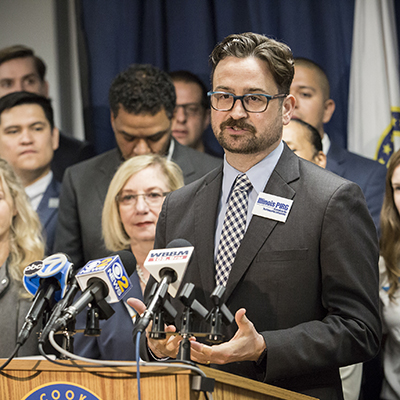
The growing bipartisan support for political reform in Illinois
While I am disappointed that Illinois voters won’t get the chance to weigh in this fall on the way legislative maps are drawn, I am optimistic about the growing bipartisan support building for political reform in Illinois.
On Thursday, the Illinois Supreme Court ruled in a 4-3 decision that the Illinois PIRG-supported independent redistricting initiative would not go on the ballot this fall. I’m disappointed Illinois voters won’t have the chance to weigh in this November on a fairer system for drawling legislative maps.
State and federal legislative maps are redrawn every ten years, after the census, to adapt to population changes and ensure fair representation in legislatures at the local, state and national level. Unfortunately, the map drawing process is often a highly partisan affair, with one party controlling the process and drawing maps that maximize their electoral advantage. Maps have also often been drawn to protect incumbents from challengers and to discriminate against minority populations. With the rise of big data and powerful computers, maps can now be drawn with a precision that truly allows politicians to “pick their voters.”
Independent commissions are a reform that takes the map drawing process out of the hands of politicians and gives it to a non-partisan panel of regular citizens who must follow a set of rules to draw fair maps. Independent commissions have shown to increase competition and minority representation in the states that have adopted this reform.
Unfortunately, the courts in Illinois have taken an incredibly narrow view of what our state constitution allows citizens to put on the ballot via the initiative process. Despite the fact that the initiative process was placed in the Illinois constitution explicitly for scenarios such as this – where the policy is stuck in the legislative process because it intersects with the self-interest of legislators — and the fact that more than half a million Illinois voters signed a petition asking for the chance to vote on the issue, we will not get that chance this November.
If you read the stories on this result, you will see the focus on the partisan split on the Supreme Court (4 Democrats formed the majority opinion, 3 Republicans the dissent) and the fact that the top legal ally of Speaker Madigan was the attorney for the group challenging the initiative. This unfortunately flattens the issue to just one more tangle between Democrats and Republicans in Illinois, or even more narrowly between Speaker Madigan and Governor Rauner.
But there is another story emerging in Illinois – one where members of both political parties are calling for reform. Any minute now, former Governor Quinn will be holding a press conference to announce a policy proposal for enacting redistricting reform in a way, he believes, the courts would allow to get on the ballot. The antagonists of the 2014 gubernatorial election, Governors Rauner and Quinn, both support reforming the way our legislative maps are drawn.
Despite attempts to characterize it otherwise, the Independent Map Amendment was a truly bipartisan effort, led by high profile Democrats and Republicans and supported by numerous non-partisan organizations like ours. Similarly, despite being vetoed two weeks ago by Governor Rauner, Automatic Voter Registration legislation was passed with broad bipartisan majorities this May and our coalition is working to overturn the veto – again, with bipartisan support. Even in his veto message, Governor Rauner expressed a desire to support Automatic Voter Registration.
So while I am disappointed that Illinois voters won’t get the chance to weigh in this fall on the way legislative maps are drawn, I am optimistic about the growing bipartisan support building for political reform in Illinois. We’ll keep working to make our democracy work the way it should, whether in regards to legislative districts, voter registration modernization, or getting big money out of our elections.
Authors
Abe Scarr
State Director, Illinois PIRG; Energy and Utilities Program Director, PIRG
Abe Scarr is the director of Illinois PIRG and is the PIRG Energy and Utilities Program Director. He is a lead advocate in the Illinois Capitol and in the media for stronger consumer protections, utility accountability, and good government. In 2017, Abe led a coalition to pass legislation to implement automatic voter registration in Illinois, winning unanimous support in the Illinois General Assembly for the bill. He has co-authored multiple in-depth reports on Illinois utility policy and leads coalition campaigns to reform the Peoples Gas pipe replacement program. As PIRG's Energy and Utilities Program Director, Abe supports PIRG energy and utility campaigns across the country and leads the national Gas Stoves coalition. He also serves as a board member for the Consumer Federation of America. Abe lives in Chicago, where he enjoys biking, cooking and tending his garden.